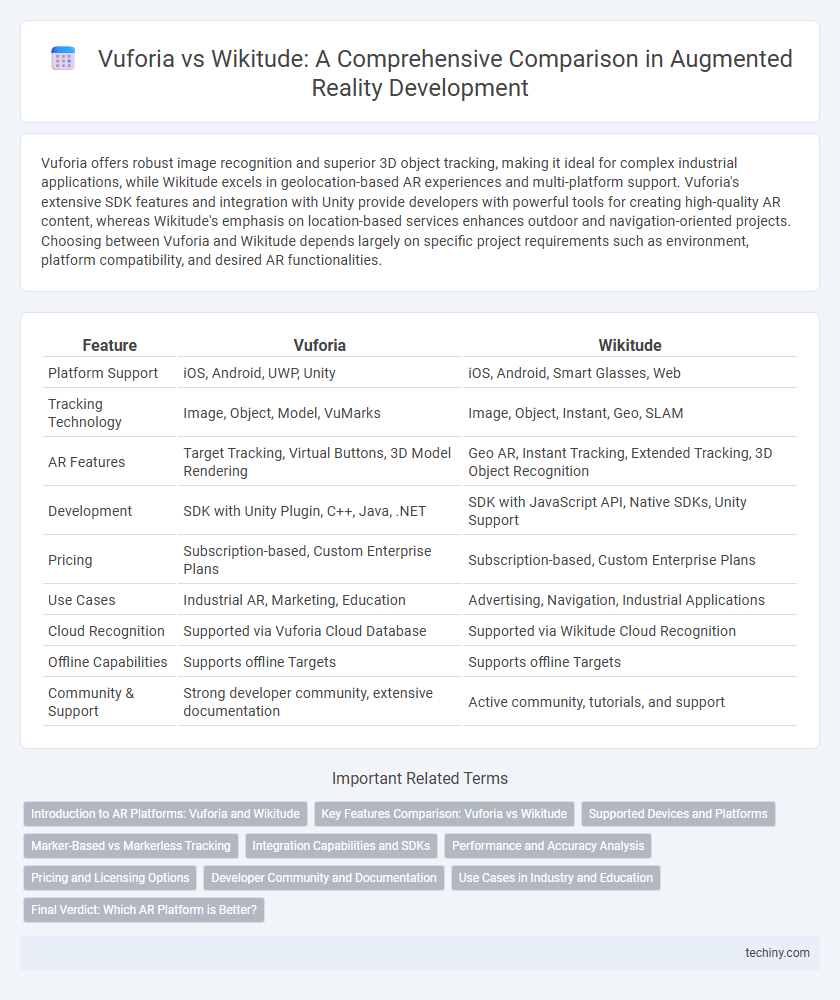Vuforia offers robust image recognition and superior 3D object tracking, making it ideal for complex industrial applications, while Wikitude excels in geolocation-based AR experiences and multi-platform support. Vuforia's extensive SDK features and integration with Unity provide developers with powerful tools for creating high-quality AR content, whereas Wikitude's emphasis on location-based services enhances outdoor and navigation-oriented projects. Choosing between Vuforia and Wikitude depends largely on specific project requirements such as environment, platform compatibility, and desired AR functionalities.
Table of Comparison
| Feature | Vuforia | Wikitude |
|---|---|---|
| Platform Support | iOS, Android, UWP, Unity | iOS, Android, Smart Glasses, Web |
| Tracking Technology | Image, Object, Model, VuMarks | Image, Object, Instant, Geo, SLAM |
| AR Features | Target Tracking, Virtual Buttons, 3D Model Rendering | Geo AR, Instant Tracking, Extended Tracking, 3D Object Recognition |
| Development | SDK with Unity Plugin, C++, Java, .NET | SDK with JavaScript API, Native SDKs, Unity Support |
| Pricing | Subscription-based, Custom Enterprise Plans | Subscription-based, Custom Enterprise Plans |
| Use Cases | Industrial AR, Marketing, Education | Advertising, Navigation, Industrial Applications |
| Cloud Recognition | Supported via Vuforia Cloud Database | Supported via Wikitude Cloud Recognition |
| Offline Capabilities | Supports offline Targets | Supports offline Targets |
| Community & Support | Strong developer community, extensive documentation | Active community, tutorials, and support |
Introduction to AR Platforms: Vuforia and Wikitude
Vuforia and Wikitude are leading augmented reality platforms known for their robust AR development capabilities. Vuforia excels in image recognition and target tracking, making it ideal for creating interactive 3D experiences in industrial and retail applications. Wikitude offers versatile features such as geolocation-based AR, instant tracking, and cloud recognition, catering to developers seeking multi-device compatibility and diverse AR content integration.
Key Features Comparison: Vuforia vs Wikitude
Vuforia offers robust image recognition, object tracking, and model targets with extensive support for Unity integration, making it ideal for industrial and manufacturing applications. Wikitude excels in geolocation-based AR, instant tracking, and extended device compatibility, supporting JavaScript for web-based AR development. Both platforms provide cloud recognition and multi-target tracking, but Vuforia emphasizes precision and CAD model integration, while Wikitude focuses on sensor fusion and location-based experiences.
Supported Devices and Platforms
Vuforia supports a wide range of devices including Android, iOS, and UWP (Universal Windows Platform), with strong integration for Unity, enhancing development across mobile and HoloLens headsets. Wikitude offers extensive compatibility with Android, iOS, and also supports smart glasses like Epson Moverio and RealWear, focusing on both marker-based and location-based AR experiences. Both platforms provide cross-platform SDKs, but Wikitude emphasizes broader support for enterprise wearable devices beyond smartphones.
Marker-Based vs Markerless Tracking
Vuforia excels in marker-based tracking by using image targets and object recognition to deliver precise augmented reality experiences, ideal for applications requiring stable and accurate overlays on predefined markers. Wikitude, on the other hand, emphasizes markerless tracking through simultaneous localization and mapping (SLAM) technology, enabling AR content placement in real-world environments without relying on physical markers. The choice between Vuforia and Wikitude depends on whether the project prioritizes reliable marker detection or flexible, markerless interactions for dynamic AR deployments.
Integration Capabilities and SDKs
Vuforia offers robust integration capabilities with support for Unity, native iOS, and Android SDKs, enabling developers to create diverse augmented reality experiences with image recognition and object tracking. Wikitude provides versatile SDKs compatible with Unity, JavaScript, and native platforms, featuring geolocation and SLAM technologies that enhance AR applications through seamless integration. Both platforms prioritize cross-platform support but differ in specialized functionalities and ease of integrating advanced AR features.
Performance and Accuracy Analysis
Vuforia delivers high performance in image recognition with its robust feature tracking and reliable marker detection, optimized for efficiency on mobile devices. Wikitude excels in GPS-based AR and visual tracking, providing precise geolocation accuracy and seamless integration with multiple sensors for enhanced real-world context. Comparative benchmarks show Vuforia outperforms in indoor AR applications, while Wikitude offers superior accuracy in outdoor AR experiences leveraging location data.
Pricing and Licensing Options
Vuforia offers tiered pricing plans including a free developer version, a Pro license starting around $42 per month, and customized enterprise solutions with advanced features and unlimited cloud recognition. Wikitude provides a flexible pricing model with a free trial, a standard license starting at approximately EUR199 per month, and enterprise licenses tailored for large-scale deployments, including SDKs for iOS, Android, and Unity. Both platforms offer royalty-free licenses and varying levels of customer support, making cost-efficiency dependent on project scale and required functionalities.
Developer Community and Documentation
Vuforia boasts a large and active developer community with extensive forums and a wealth of tutorials, providing robust support for augmented reality projects. Wikitude also offers comprehensive documentation alongside sample codes and SDKs, fostering ease of use for developers at various levels. Both platforms maintain strong developer engagement, but Vuforia's community size and detailed resources often give it an edge in onboarding and troubleshooting.
Use Cases in Industry and Education
Vuforia excels in industrial applications with robust object recognition and markerless tracking, making it ideal for manufacturing, maintenance, and training scenarios where precise spatial mapping is critical. Wikitude offers versatile location-based AR and image recognition features well-suited for immersive educational experiences and field-based learning, supporting diverse devices with easy integration. Both platforms enhance industry and education by enabling interactive, context-aware overlays, but Vuforia is preferred for complex industrial workflows while Wikitude is favored for educational content delivery and outdoor use cases.
Final Verdict: Which AR Platform is Better?
Vuforia excels with robust image recognition, extensive device compatibility, and a strong developer community, making it ideal for industrial and large-scale AR applications. Wikitude offers superior location-based AR features and flexible SDK options, suited for outdoor and mobile experiences. Choosing between Vuforia and Wikitude depends on project requirements: Vuforia for precise object tracking and Wikitude for geolocation-driven AR innovation.
Vuforia vs Wikitude Infographic

 techiny.com
techiny.com